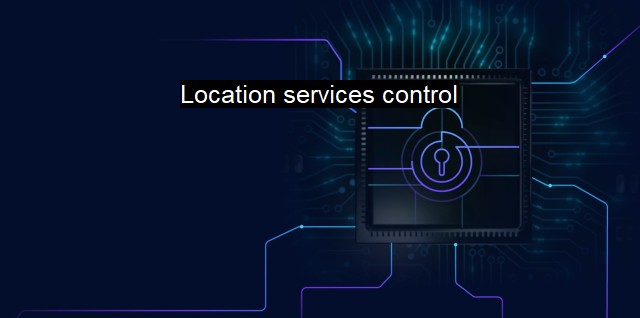What is Location services control?
Balancing Privacy and Convenience: The Advantages and Risks of Location-Based Services and the Importance of Location Services Control in Antivirus and Cybersecurity Applications
Location Services Control refers to a device's capability of remotely tracking the geographic location typically using the in-built GPS system. This feature is often harnessed in mobile devices such as smartphones, tablets, smartwatches, and even in some technologically advanced computers. While most users do not mind leveraging location services due to the added convenience, from a cybersecurity perspective, it reveals a worrying potential for misuse and exploitation.The handling of location data and the need for meticulous oversight becomes critical when considering the vulnerability to cyber attacks. a potential attacker or malicious entity can access sensitive information about the user's general area, specific whereabouts, or even travel patterns by illegally acquiring location data. Such inappropriate use of information can indeed further exacerbate the scale of an attack and increase its impact manifold, thereby jeopardizing user safety and privacy.
Cybersecurity threats associated with location services are multi-dimensional. One of the most concerning scenarios is where an attacker uses the breached location data for stalking or harassment. In business contexts, the ramifications elevate as attackers misuse location-based insights to strategize corporate espionage or data theft. Mapping out transportation or business trips can enable a planned intrusion during the assured absence. Alternatively, location services when blended with other data like browsing habits or shopping preferences could help preset phishing attacks, sending tailor-crafted emails or messages based on frequented locations.
The control of location services in a device also attains salience in the conversation about antivirus software. If left unchecked, worm or virus programs may exploit location information by transmitting their malice from device to device, affecting a widespread geographical area, a concept known as "geo-targeting". Antivirus software leverages location services control to detect such malicious programs, preventing them from spreading and causing large-scale damage.
Antivirus software can also use location services control to identify and combat location-spoofing activities. Some malicious programs can trick a device into thinking it is in a different geographical area, exposing the device to customized threats prevalent in that region. Antivirus software can easily identify such threats and trigger necessary safeguards.
In order to maintain software integrity and protect the users, it is essential not to consider location services control in isolation but rather as a composite part of a broader cybersecurity framework. Users should be mindful about whom they are granting location access to, and app creators must develop software that adheres to location data best practices – asking for specific consent, maintaining transparency about data usage, and ensuring the option to turn off location access when desired.
While cybersecurity breaches can have different implications based on the specific location data compromised, Location Services Control helps in preemptive detection of threats and countermeasures. It protects sensitive location data, ensures user privacy, and guarantees device safety. When correctly employed and properly managed, location services control can play a crucial role in mitigating data breach risks, thereby bolstering overall cybersecurity efforts and enabling a safer cyber ecosystem.
"location services control" is an important cybersecurity mechanism that enables users and their devices protection on various fronts - privacy, data integrity, and safeguarding from cyber threats. By enabling location services control, users can ensure optimal cybersecurity while enjoying the conveniences of modern technology. It reminds us that while advancing technology presents us with new threats, novel solutions to counter these threats are also constantly evolving.

Location services control FAQs
What are location services control?
Location services control refers to the ability to manage the access to location data of a device. It allows users and cybersecurity software to enable or disable location sharing, as well as control which apps have access to the device's location information.Why is it important to have location services control?
Having location services control is important for cybersecurity because location data can be used to track a user's movements and reveal sensitive information. By controlling the access to location data, users can protect their privacy and prevent sensitive data from being exposed to potential cyber threats.How can I access location services control on my device?
The process for accessing location services control will vary depending on the device and operating system. Typically, it can be found in the device settings under the "Location" or "Privacy" section. It can also be accessed through security and antivirus software that includes location services control as a feature.Can antivirus software help with location services control?
Yes, many antivirus software programs include location services control as a feature. This allows users to manage location data directly from the antivirus software, giving them more control over their privacy and cybersecurity. Some antivirus software programs also provide additional features such as location tracking and remote locking and wiping of lost or stolen devices.| | A | | | B | | | C | | | D | | | E | | | F | | | G | | | H | | | I | | | J | | | K | | | L | | | M | |
| | N | | | O | | | P | | | Q | | | R | | | S | | | T | | | U | | | V | | | W | | | X | | | Y | | | Z | |
| | 1 | | | 2 | | | 3 | | | 4 | | | 7 | | | 8 | | |||||||